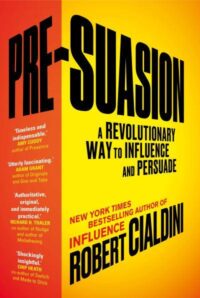Reading Notes for:


PRE-SUASION: THE FRONTLOADING OF ATTENTION
It wasn’t long after I began operating undercover in the training classes of influence practitioners that I encountered something curious: participants in the sessions were nearly always informed that persuasion had to be approached differently in their particular profession than in related professions.
They didn’t focus enough on an extraordinarily useful other question: What’s the same?
I identified only six psychological principles that appeared to be deployed routinely in long-prospering influence businesses. I’ve claimed that the six—reciprocation, liking, social proof, authority, scarcity, and consistency—represent certain psychological universals of persuasion; and I’ve treated each, one per chapter, in my earlier book, Influence .
Importantly different from Influence is the science-based evidence of not just what best to say to persuade but also when best to say it. From that evidence, it is possible to learn how to recognize and monitor the natural emergence of opportune moments of influence. It is also possible (but more perilous, from an ethical standpoint) to learn how to create—to make—those moments. Whether operating as a moment monitor or a moment maker, the individual who knows how to time a request, recommendation, or proposal properly will do exceedingly well.
Effective maneuvering illustrates perfectly another major assertion of this book: pre-suasive practices create windows of opportunity that are far from propped open permanently.
It’s because of the only-temporary receptiveness that pre-suasive actions often produce in others that I’ve introduced the concept of privileged moments. The meaning of the word privileged is straightforward, referring to special, elevated status. The word moment, though, is more complex, as it evokes a pair of meanings. One connotes a time-limited period: in this case, the window of opportunity following a pre-suasive opener, when a proposal’s power is greatest. The other connotation comes from physics and refers to a unique leveraging force that can bring about unprecedented movement.
The concept of privileged moments, identifiable points in time when an individual is particularly receptive to a communicator’s message.
The factor most likely to determine a person’s choice in a situation is often not the one that offers the most accurate or useful counsel; instead, it is the one that has been elevated in attention (and thereby in privilege) at the moment of decision.
Channeled attention leads to pre-suasion: the human tendency to assign undue levels of importance to an idea as soon as one’s attention is turned to it.
